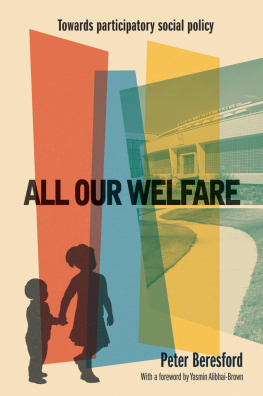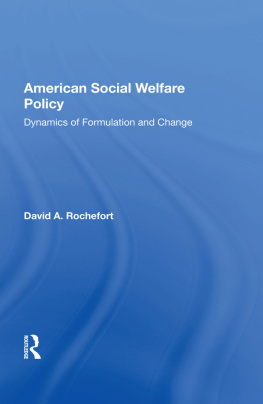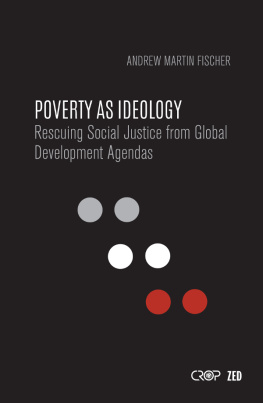Moral Authority, Ideology,
and the Future of
American Social Welfare
Moral Authority,
Ideology, and the
Future of American
Social Welfare
Andrew W. Dobelstein
University of North Carolina, Chapel Hill
First published 1999 by Westview Press
Published 2018 by Routledge
711 Third Avenue, New York, NY 10017, USA
2 Park Square, Milton Park, Abingdon, Oxon OX14 4RN
Routledge is an imprint of the Taylor & Francis Group, an informa business
Copyright 1999 Taylor & Francis
All rights reserved. No part of this book may be reprinted or reproduced or utilised in any form or by any electronic, mechanical, or other means, now known or hereafter invented, including photocopying and recording, or in any information storage or retrieval system, without permission in writing from the publishers.
Notice:
Product or corporate names may be trademarks or registered trademarks, and are used only for identification and explanation without intent to infringe.
Library of Congress Cataloging-in-Publication Data
Dobelstein, Andrew W.
Moral authority, ideology, and the future of American social
welfare / Andrew W. Dobelstein.
p. cm.
Includes bibliographical references and index.
ISBN 0-8133-3311-3 (hardcover). ISBN 0-8133-3312-1 (pbk.)
1. Public welfareUnited States. 2. Social valuesUnited
States. 3. IdeologyUnited States. 4. United StatesSocial
policy1993- I. Title.
HV91.D63 1999
361.973dc21
98-29480
CIP
ISBN 13: 978-0-8133-3312-0 (pbk)
Contents
| AARP | American Association of Retired Persons |
| ADC | Aid to Dependent Children |
| AFDC | Aid to Families with Dependent Children |
| APWA | American Public Welfare Association |
| CCC | Civilian Conservation Corps |
| CETA | Concentrated Employment and Training Act |
| CORE | Congress of Racial Equality |
| COS | Charity Organization Society |
| CPI | consumer price index |
| CPS | Current Population Survey |
| DHEW | Department of Health, Education, and Welfare |
| DHHS | Department of Health and Human Services |
| DRG | diagnostically related group |
| EPSDT | early and periodic screening, diagnosis, and treatment |
| EUC | emergency unemployment compensation |
| FAP | Family Assistance Plan |
| FICA | Federal Insurance Corporation of America |
| FSB | federal supplemental benefits |
| GAI | guaranteed annual income |
| GAIN | Greater Avenues to Independence |
| HCFA | Health Care Financing Agency |
| JOBS | Job Opportunities and Basic Skills |
| JTPA | Jobs Training and Partnership Act |
| MDRC | Manpower Demonstration Research Corporation |
| MDTA | Manpower Development and Training Act |
| NAACP | National Association for the Advancement of Colored People |
| NLSY | National Longitudinal Survey of Youth |
| OAI | Old Age Insurance |
| OASDHI | Old Age, Survivors, Disability, and Health Insurance |
| OASDI | Old Age, Survivors, and Disability Insurance |
| OCSE | Office of Child Support Enforcement |
| PPI | producer price index |
| PSID | Panel Study of Income Dynamics |
| PWA | Public Works Administration |
| SNCC | Student Non-violent Coordinating Committee |
| SSI | Supplemental Security Income |
| TANF | Temporary Assistance for Needy Families |
| TUC | Temporary Unemployment Compensation |
| VISTA | Volunteers in Service to America |
| WCTU | Womens Christian Temperance Union |
| WIN | Work Incentive Program |
| WPA | Works Progress Administration |
A crisis in welfare has been brewing in America for many years. In some ways it has been a quiet crisis. Poverty, crime, poorly educated children, miserable housing, and other symptoms of social decay have easily been accepted as necessary consequences of a highly advanced, technically oriented society. But in other ways the welfare crisis has been noisy. Loud voices proclaim the futility of increased public spending without much to show for it.
The welfare crisis seemed to come to a head in 1996, when the Republican party won control of the U.S. House of Representatives. Newt Gingrich (R.Ga.) led the Republican revolt with his Contract with America; one of the clauses in this contract called for reforming welfare through limiting welfare support to people who would not work or who gave birth to children out of wedlock. Two years previously, Arkansas governor Bill Clinton had called for similar reforms, promising completely to change welfare.
No one, it seemed, liked welfare. Taxpayers hated it because it cost too much and did too little. Politicians hated it because it made them look liberal if they reflected positive views about it. Welfare clients hated it because it deprived them of their dignity. Even welfare workers hated it because it made them work too hard and paid them too little.
In some ways the attacks on welfare contrasted with less well articulated public sympathy for those in need. As more and more American families struggled to hold two and three jobs in order to stay out of poverty, churches, foundations, corporate executives, and others sought ways to help them. It was the system of welfare that was under attack rather than an erosion of compassion for the poor. Welfare in America had become so complex, so disorganized, so aimless that no one seemed to understand it anymore, let alone think what could be done about it.
Before anything substantive about welfare could be doneeither to improve it or eliminate itpeople had to know something about welfare: how welfare developed, the ideas that gave welfare purpose, and how welfare came to be what it is today. Moreover, with increasing antiwelfare rhetoric it became more and more clear that welfare has not developed in harmony with the rest of America. That welfare does not easily fit into the American scheme of things is no revelation, but the mounting dissatisfaction over the growth in welfare suggests that there are limitations in the American system that prescribe not only how far welfare can grow but also the shape or kind of welfare system America is able to create.









